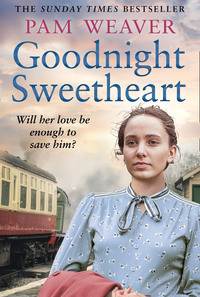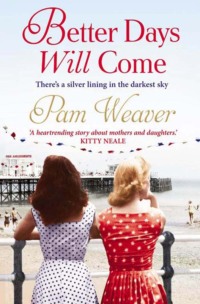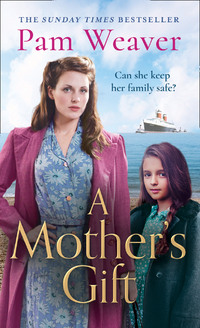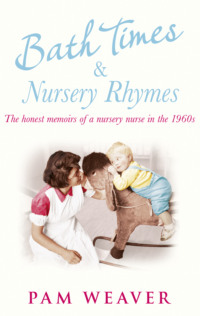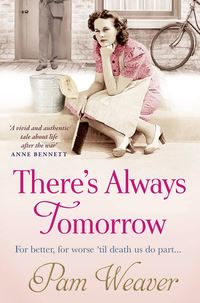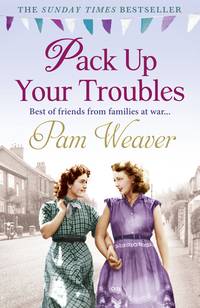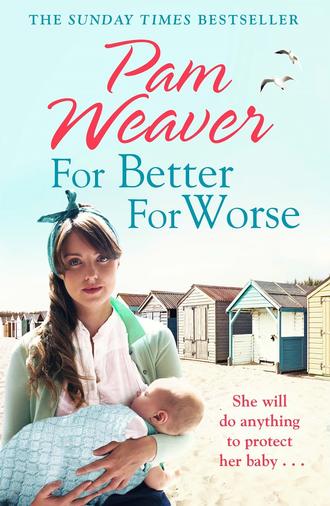
Полная версия
For Better For Worse
Vera glanced around as if to see who was looking. Sarah quickly explained about the goldfish and the funeral Jenny had planned for it and Vera agreed to bring Carole along. ‘Only for a minute, mind,’ she cautioned. ‘Bill will be expecting his tea.’
Back home, Sarah used a tablespoon to dig a hole in the postage stamp garden. When she’d finished, she’d stared down at it hoping it was deep enough. It definitely wasn’t the regulation six feet, but that would be ridiculous, wouldn’t it? How deep do you need to go for a fish? When she’d got up that morning, Jenny was already up and decorating Goldie’s coffin. She’d drawn flowers all over the sides and she’d even stuck some bits of ribbon on the lid. There was a note as well. Sarah’s eyes pricked as she read, ‘Gudbi Golldy.’
The rest of Sarah’s day was full. She took Lu-Lu to the pub where she cleaned the bar and toilets. Lu-Lu sat in her pram playing happily with some old beer mats and eventually fell asleep. After work, she took Henry’s suit and other things to the second-hand shop on North Street, where Lil Relland gave her five bob for the lot. The man in Warner’s valued the cigarette case at twelve shilling and offered her ten. Sarah was in no mood to argue. She took the money.
After school, Vera and Carole came around and Jenny organised everybody for the fish’s funeral. As they stood in the small yard, Lu-Lu in Sarah’s arms, Carole read a poem something along the lines of:
No more Goldie swimming round and round the water,
swimmin’ like a little goldfish aughta …
while the two sisters, in a rare moment of shared pleasure, struggled to keep a straight face. Then with a clear voice, Jenny put her hands together, grace style, to say thank you to God for Goldie.
‘Dear God, please look after Goldie in heaven. I know it’s a big place and she might get lost if the angels don’t look after her. And … please remember she gets scared if she’s left on her own. Amen.’
Sarah dared not look at Vera as she put Lu-Lu down and began to fill in the hole.
‘Wait a minute, Mummy!’ Jenny turned to run indoors. Sarah looked at Vera and gave her an exaggerated shrug. They waited, each avoiding the other’s eye, until Jenny came back out with the metal bridge from Goldie’s goldfish bowl. Everybody watched as Jenny knelt reverently beside the hole and placed it on top of the box. ‘She likes to swim around that,’ said Jenny.
As she stood up, Sarah pushed some earth over the edge with her foot and eventually the hole was filled.
When it was all done, Carole wanted to sing a hymn, so they plumped for All Things Bright and Beautiful. As they sang, Sarah’s heart was heavy. Not so much for the little fish lying there but for her little girl, having her first encounter with death and loss. What with Henry going, Sarah wondered how this might affect Jenny. Would she become terrified that she was going to lose everyone she loved? Vera sniffed (or was it giggled?) into her handkerchief. They marked the grave with the only piece of wood Sarah could find. Made out of two broken pieces of fence panelling and held together with a six-inch nail, the cross was ten times the size of the little body in the ground.
After the service was over, Sarah gave Jenny the baby booties for her dolly, hoping it would soften the blow. Apparently it did, because before long, the two older girls were playing out on the street, while their mothers sat at Sarah’s table with a cup of tea. Sarah held Lu-Lu on her lap. Vera seemed very quiet, so Sarah took the initiative. ‘How’s life treating you?’
‘Very well,’ Vera beamed. ‘Bill has just got a promotion. He’s foreman in the coach works now and since they nationalised the railways, the firm thinks they’ll get a lot more work.’
‘That’s good,’ said Sarah.
‘Well, you can’t have a railway without carriages, can you?’ Vera joked. She frowned. ‘I hardly like to ask, but any news of Henry?’
Sarah shook her head. ‘Not a dickie bird.’
Vera tutted. ‘I still can’t believe it. The swine. He took us all in, didn’t he? I mean, fancy leaving you in the lurch like that. He always seemed such a nice man. You didn’t say anything funny to him did you?’
‘No!’ Sarah frowned crossly. Vera only knew the half of it. She’d never told her sister how demanding Henry had become and how difficult to live with. When he’d left, he’d taken all the money in the house, including the rent money and the emergency money in the jar.
‘Bill is still convinced something’s happened to him,’ said Vera. ‘They were such good mates.’
Sarah shrugged and stared into the depths of her cup. ‘The police said he’d gone of his own volition.’ What else could she say? As far as she knew, Henry had never contacted any of their friends or relations, and yet before the war, the four of them had had some good times together before the kids came along. As soon as Jenny and Carole were born, the men became occasional drinking companions, sometimes in Littlehampton and other times at the Half Brick. She smiled as she remembered one occasion when they lived in Pier Road, Henry came home on his bicycle, telling her that on the way to the pub he’d nearly fallen off when a lone Home Guard stepped out into the road and put his hand up.
‘Whatever for?’ she’d gasped.
‘He wanted to know what I was doing out at this time of night,’ Henry had chuckled. ‘I looks at my watch. “It’s only 9.30,” I says and then he wants to know where I’d been. “To the pub,” I told him. “Aren’t there any public houses nearer home?” he asks me.’ By now, they were both laughing.
‘But why on earth would he do that?’ Sarah had wanted to know.
‘He was a just a rookie having a bit of a practice,’ Henry had chuckled.
‘If you were a ruddy German,’ she had laughed, ‘you’d hardly invade the country on your own … and on a pushbike.’
Vera interrupted her thoughts. ‘You seem to be managing all right then?’
‘Oh yes,’ Sarah smiled. Pride prevented her from telling her sister just how hard things really were. She couldn’t bear to hear her sister say, ‘I told you so …’
‘If you need a few bob,’ said Vera, reaching for her bag, ‘I suppose I might be able to spare …’
‘Don’t worry,’ Sarah interrupted as she felt her face heat up. Perhaps she could have done with a few bob, but Vera’s grudging and condescending manner meant that her pride got in the way. If the boot was on the other foot, she thought darkly, would I embarrass you the way you embarrass me? I think not. They drank their tea in silence. Sarah had little to say and the atmosphere between them had become rather awkward.
‘Did I tell you we’re moving?’ Vera asked.
‘No?’
‘We’re buying a house in Lancing,’ Vera beamed. ‘Annweir Avenue. The railway is helping us with getting a mortgage and Bill wanted to be closer to the carriage works anyway. I can’t wait.’
Sarah swirled the tea in her cup. ‘Sounds good.’
‘Bill is going to do it up and we may take a lodger. You know … someone respectable.’
Vera’s husband had done well for himself in the Lancing Carriage Works and the workforce was a close-knit community. During the war years, they had been kept busy repairing bombed-out carriages because the shortage of petrol meant that the railways had to be kept going whatever the cost. Henry had worked in a jeweller’s shop in Littlehampton until he was called up. It was through his friendship with Bill and the local cricket club matches that he and Sarah had met in the first place. Life was strange. It may have dealt her a bad hand but she was happy for her sister. They seemed to be doing really well.
‘The new British Railways have some brilliant new ideas,’ said Vera. She was on a roll now. ‘There’s talk about having an open day next year and inviting families and friends to come and have a look around. If they do it, you must come too.’
‘Sounds fun,’ said Sarah.
‘It’s free but they’re raising funds for the Southern Railway Servants’ Orphanage and Homes for the Elderly. You will come, won’t you?’
‘Try and keep me away,’ said Sarah, stifling a yawn. It was becoming more and more difficult to talk to Vera. As they’d got older, they had less and less in common. She felt uncomfortable and the conversation was always very one-sided. ‘How long before you leave Worthing?’
Vera shrugged. ‘Two weeks, a month? There’s still a bit of paperwork to do but the house is already empty.’ She stood to leave, calling her daughter to her and explaining that she had to get back for Bill’s tea.
‘It was lovely seeing you again,’ said Sarah, planting a kiss on Vera’s proffered cheek.
‘By the way,’ Vera said in a rather loud voice as she stepped out onto the street, ‘I’ve got a few bits and bobs you can have that belonged to Carole when she was a baby. They’re a bit worn but they might come in useful for Lu-Lu.’
A couple of her neighbours were walking by. Sarah averted her eyes. ‘Thank you,’ she said quietly as she felt her face colour. ‘That’s very kind of you.’ She couldn’t say no. The children needed clothes and she knew she shouldn’t feel this way, but did she have to tell the whole street? She closed the door, grateful that Vera and Carole had gone.
Later, when the children were in bed and asleep, there was a knock on the door. Sarah was surprised to see Mrs Angel and Peter Millward, the coalman, on her doorstep. Mrs Angel looked much the same as she always did, with her snow-white hair falling from her loose bun, but Peter was all spruced up. He was wearing his demob suit, a white shirt and a black tie. His thinning hair was slicked down and he was holding a bunch of lily of the valley.
‘May we come in Sarah, dear?’ said Mrs Angel.
Tight-lipped and angry, Sarah kept her back to them as she made a pot of tea. If Mr Millward had been there on his own she would have slammed the door in his face, but having Mrs Angel by his side meant that she felt the need to be polite. She’d carelessly cast his bunch of flowers onto the draining board without a word of thanks. In fact, she hadn’t said a word since the pair of them walked in the door. How dare he come back! And how dare he get someone as nice as Mrs Angel involved as well. She put a cup of tea in front of them, making sure she slopped some of Peter’s drink in the saucer, and sat at the table, her eyes fixed on Mrs Angel.
‘Peter wants to ask you something,’ said Mrs Angel.
‘Does he now,’ said Sarah coldly. ‘Well, I’m sure I have nothing to say to him.’
Mrs Angel put up her hand. ‘It seems there’s been a terrible mistake, dear.’
Sarah opened her mouth but then Peter said, ‘I’m a man of few words, missus, and sometimes they come out all wrong.’
Sarah turned to give him a cold hard stare.
‘I need a bookkeeper,’ he blurted out.
Sarah blinked in surprise. ‘A bookkeeper?’
He nodded.
‘I don’t know why we didn’t think of it before, dear,’ said Mrs Angel. ‘It’s something you could do from home. What I mean is, you wouldn’t have to get someone to look after the children.’
‘A bookkeeper,’ Sarah repeated. ‘I used to be good at sums at school, but I’ve never done anything like bookkeeping.’
‘Perhaps not, dear,’ said Mrs Angel, ‘But I can help you get started and there’s nothing to it. You just have to be methodical.’
Sarah’s gaze went to Mr Millward. ‘I can’t pay you,’ he began. ‘I’ve only just started out myself, but I could pay you in kind.’
Sarah felt herself relaxing. ‘With a bag of coal?’ He nodded furiously and she began to laugh. ‘You know what,’ she said. ‘You’ve got yourself a bookkeeper.’
Mr Millward beamed.
‘I owe you an apology,’ said Sarah, but he waved a hand and shook his head. ‘Yes, I do,’ Sarah insisted. ‘It’s just that since my husband disappeared, a few people have made some rather improper suggestions.’
Mrs Angel looked away but Mr Millward continued to stare. ‘Henry has disappeared?’
‘Yes,’ said Sarah. ‘Didn’t you know? He walked out on me and the children some time ago.’ She picked up her cup and tried to appear nonchalant. ‘I haven’t seen hide nor hair of him since.’
‘A terrible thing to do,’ said Mrs Angel, shaking her head. ‘Those poor little girls need a daddy.’
‘But your Henry hasn’t disappeared,’ Mr Millward exclaimed. ‘I’ve seen him.’
Sarah was aware that her mouth had dropped open, but the news had rendered her speechless.
Mrs Angel clutched at her throat. ‘You saw him?’
‘My old Mum lives in Horsham,’ said Mr Millward, addressing Mrs Angel. ‘I go to see her every week. I was there last Sunday and I saw him just down the road from Mum’s place. He didn’t see me, but I saw him.’
Sarah took in a breath. ‘Did he look all right? I mean, was he well?’
‘Yeah, he looked fine.’ But as he looked at Sarah, the colour in his face rose and he shifted uncomfortably in his chair. ‘I don’t know how to tell you this, missus, but he wasn’t alone. He was arm in arm with some young woman.’
Two
Annie Royal crept downstairs and into the kitchen. It was 6.30 a.m. and Henry would be up soon. She had laid the table the night before, so there wasn’t a lot to do. Today was his birthday and she was planning a little surprise. Tying her ash-blonde hair up with a scarf, she put an apron on over her nightdress.
She loved her little house. It was the sort of home every girl dreamed of. Fairly near the centre of town, it had its own backyard and even a tiny front garden. She had a dining room and an upstairs bathroom with hot and cold running water. When they’d moved in, they had spent several happy weeks redecorating. All the dark greens and browns of yesterday were gone so that the house was light and airy. The country was still suffering hard times after the war so their furniture was utility, but it was clean and sturdy, and Henry promised that as soon as he got a raise, they would look for some more modern stuff like the furniture she’d shown him in her magazines.
Their wedding had been a quiet affair. It wasn’t what she’d dreamed of but she tried not to mind too much. She had always wanted a big do with all of the family there, but when Henry had worked in her father’s jewellery shop they had fallen out over something. She’d tried to find out what had happened, but both men were too stubborn to say. Henry had tried to make it up to her as they’d planned their wedding almost a year ago. The registry office was full of flowers and the woman who cleaned the brasses on the front door and a passer-by had been their witnesses. All through the ceremony, which was breathtakingly short, Annie kept looking around, hoping that Mum and Father would come dashing in muttering apologies that their car had broken down or the bus was late or they’d missed the train, but it never happened.
Of course, Henry could see how upset she was and he was kindness itself.
‘It’ll be all right, darling,’ he’d nuzzled in her ear. ‘Don’t let it spoil our special day,’ and his tender kisses helped to take some of the disappointment away. So long as she did what he told her, Henry was her hero, her knight in shining armour.
Instead of a reception, they’d had a meal in a pretty restaurant. Somehow the people found out that they’d just got married (probably Henry’s doing again) and they’d made a huge fuss of them, giving them a free glass of wine each and handshakes all round. Annie blushed modestly and thought herself lucky or blessed or a mixture of both. Henry was light-haired, suave and sophisticated and, in her eyes, even better looking than Ronald Colman, the star he so much admired. He was so loving and caring as well. Her honeymoon nights spent right here in their own home were full of his lovemaking and her days packed with his kisses. He paid her compliments all the time and she was convinced that she would be the envy of all her friends if ever she got to tell them. Henry wasn’t one for visiting. He said he preferred them to spend their weekends by themselves, so she hadn’t seen anybody for ages. Still, it didn’t matter. Not really. She smiled to herself. Henry was so romantic, just like the film stars at the pictures. Whenever she and Henry went out, he was even mildly jealous when other men looked at her. She’d laugh gaily and tell him it was his own fault because he would keep buying her pretty dresses and scarves as well as things that were for his eyes only in the bedroom. Henry was exciting, passionate and all hers …
When she’d written to tell her parents they were married, Mum wrote back protesting that they’d never received the invitation.
‘Of course they did,’ Henry had said crossly. ‘I posted it myself.’
‘I’ll pop over and see them,’ she’d said, but Henry didn’t feel it was wise.
‘Why ever not?’ she’d protested.
‘Leave it for a while,’ he’d counselled. ‘Let things settle down.’
Annie was reluctant, but then her new husband had given her a wounded look and complained that everyone was ganging up on him, so she’d let it go.
Annie had settled down to domesticity and looking after Henry. He wouldn’t hear of her getting a job. ‘No wife of mine will ever have to go out to work,’ he’d declared stoutly. It was fun at first, but she soon got bored.
She had only been married for five months when she discovered she was pregnant. Henry was over the moon and did his best to treat her like a piece of delicate china.
‘I’m only pregnant,’ she’d laughed, ‘not ill.’
Henry had screwed up his nose. ‘Don’t use that word, darling,’ he said. ‘It sounds so vulgar.’
She was taken aback. ‘Then what …’
‘Say you’re in the family way,’ he said, kissing her ear. He was funny like that. Prudish over some things and yet such an accomplished lover in the bedroom. She supposed it might be because of his Rhodesian upbringing. Henry had come to this country as a boy to get an English education and for some reason far beyond Annie’s understanding, had never gone back.
As soon as she heard Henry moving about upstairs, Annie put a pan of water on the gas stove and lit the flame underneath. She took the loaf out of the breadbin and unwrapped it. She always kept it covered with a damp tea towel to keep it fresh. Her neighbour, Mrs Holborn, had given her that useful tip. All she had to do now was make the tea.
Annie had met Henry just over a year ago. He didn’t talk much about his past or his wartime experiences because he had been captured in the early days and spent almost all of the war years as a POW. He was a lot older than her. She was eighteen and he was thirty-six today. She’d adored him from the start, but her father, who had taken Henry on in the jewellers’ shop, had been more cautious.
‘He’s deep that one,’ Father had said. ‘He may be a good worker, but we don’t really know much about him.’
Of course, her parents were concerned because their courtship had been so short. ‘All I know is that I love him and he loves me,’ Annie had said stoutly, and now that Henry was her husband and she was expecting his baby, she had high hopes that Henry and her father would make friends again.
‘I know Father can be difficult,’ she’d pleaded with Henry, ‘but please try and like him just a little bit.’
‘I do, darling,’ Henry protested. ‘Really I do, but the man is impossible.’
She sighed. Perhaps he was right. She’d written to her parents several times, but they’d never replied.
She could hear Henry coming out of the bathroom, so she put the eggs into the boiling water and two slices of bread under the grill.
‘What are you doing up so early?’ he asked as he walked into the kitchen.
She indicated his chair and he sat down. Putting her arms around his shoulders, she kissed the top of his head. ‘Two boiled eggs, three minutes, just as you like them, coming up,’ she said, putting the toast and butter in front of him.
Henry smiled. ‘Thank you, darling.’ He patted her arm. ‘When I’ve gone to work, I want you to go back to bed.’
‘Henry, I’m fine,’ she said, reaching for the teapot.
‘A woman in your condition …’ Henry began again.
‘Please don’t worry about me,’ she protested as she put one egg in the egg cup and the other on the plate. ‘I’m fine.’
‘Please don’t argue with me,’ he said, his pale eyes narrowing slightly. ‘I think that as your husband, I’ll be the judge of what’s best.’
‘Yes,’ she faltered. She mustn’t make him angry. It was a bit scary when he shouted. ‘You’re right. I’ll go back and lie down once you’ve gone to work.’
‘I only have your best interests at heart,’ he said, slicing off the top of the egg smartly with the knife. The yolk, a thick, rich orange, spilled over the side of the egg cup and onto the plate. ‘Yours and the baby’s.’
‘I know,’ she sighed. She sat opposite him and drank her tea, but she was in no mood to eat.
As her pregnancy advanced, Henry was most insistent that she lead a quiet life. ‘First babies can be difficult to carry,’ he told her. ‘I want you to rest as much as possible.’
As he constantly reminded her, Annie had promised to love, honour and obey him, but at times it was very boring. She cleaned the house and did the shopping, always remembering to buy his favourite coffee crunch sweets and settling into a weekly routine. On Mondays it was washing, Tuesday cleaning upstairs, Wednesday she did the ironing and Thursday she tackled the downstairs. On Friday it was a little light gardening until she got too big and then it was time to get the sewing machine out and make a layette for the baby. On Saturdays and Sundays Henry was home so she read books and knitted and sometimes they went for a walk. She loved the little market town. It seemed so bright and cheerful after the war. She loved the striking façade of the Black Horse Hotel with its pretty window boxes, and the Carfax, a sort of market square with its own bandstand. Even the posh new toilets in the Bishopric were a talking point, but with so little else to stimulate her mind, Annie could hardly wait for the baby to come.
A man came to decorate the nursery. He was good-looking, funny and friendly, but Henry said he didn’t like the standard of his work, so they had to find another. The new man turned out to be rather dour, but despite his advancing years, he got the job done eventually.
She set her teacup down on the table. ‘I thought I might write to my mother and ask her over,’ she said as he tucked into his second egg.
‘I don’t think so,’ said Henry tartly. ‘You know how awkward your father can be and I won’t have you upset.’
Disappointed, she showed no emotion as she handed him a present. ‘Happy birthday, darling.’
‘Birthday? Oh! So it is.’
She was slightly surprised that he hadn’t bothered to remember his own birthday, but his enthusiastic praise for the box of handkerchiefs she’d given him put her in a better mood. She went with him to the front door but he kissed her in the hallway.
‘Don’t let anyone see you looking like that,’ he said, pushing her behind the door. ‘Back to bed now.’
Using the door as a shield, she lingered in the hallway and blew a kiss as he closed it. After that, she went into the sitting room to watch him go towards the station. Across the street, she saw a woman walking in the opposite direction suddenly dart into the gateway of a house. Lifting the net curtain, Annie watched her husband’s back until he reached the end of the road and walked out of sight. When she turned her head again, the woman was still there. She seemed to be watching Henry as well, but who was she? Annie had never seen her before. She was elegantly dressed in a lilac two-piece. The jacket had a nipped-in waist and the flowing skirt was a perfect imitation of the New Look. She wore a small, brimmed hat with a circle of netting on the side. She seemed rather nervous as she watched Henry go to the end of the road, moving her clutch bag from one hand to the other. She waited until he’d turned the corner before she came out onto the pavement again and, opening her bag, she took out a cigarette case. Annie watched her take one out and put it between her lips and, as the woman fired her lighter, she turned towards the house to shield the flame. Her cigarette lit, the woman looked up and their eyes met. They stared at each other for a split second then, as the woman took a long drag on her cigarette, Annie let the curtain drop. A moment later, the woman turned and walked on.


